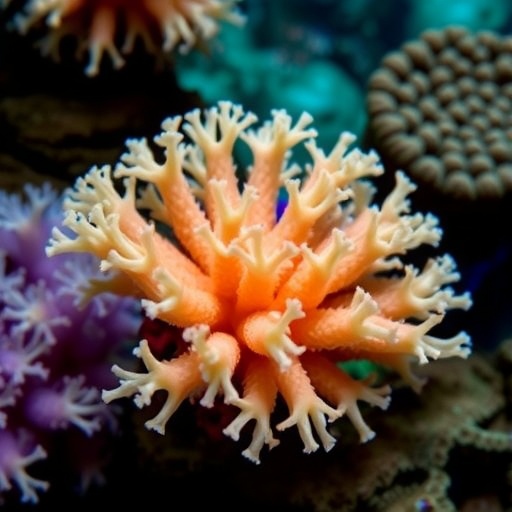In the relentless march of climate change, coral reefs—the vibrant undersea cities of biodiversity—are facing unprecedented threats. Marine scientists have long sought innovative strategies to bolster coral resilience and facilitate reef restoration. Now, a groundbreaking study from the University of Technology Sydney (UTS) presents a beacon of hope through the power of nutrition, unveiling that feeding coral larvae a specialized “baby food” enriched with targeted lipid supplements dramatically enhances their survival, growth, and stress tolerance.
This pioneering research, spearheaded by marine biologist Dr. Jennifer Matthews and published in the prestigious journal Communications Biology, delves deeply into the metabolic and physiological needs of coral larvae in their critical early stages. The team formulated tailored lipid supplements particularly rich in omega-3 fatty acids and essential sterols—biochemical compounds fundamental to cell membrane integrity and cellular signaling. By emulsifying these lipids into the larval diet, they observed a remarkable improvement in the larvae’s swimming capacity and their ability to withstand elevated temperatures.
Such findings address one of the most vexing challenges in reef restoration: the abysmally low survival rate of coral larvae post-settlement. Typically, fewer than one percent survive beyond their first year in the wild, a bottleneck that severely limits the scale and success of reef rehab initiatives. Dr. Matthews explains that providing coral larvae with the right nutritional balance, especially lipids like sterols, can substantially increase survivorship by fortifying the larvae’s physiological resilience before they settle onto reef substrates.
At the cellular level, sterols serve several indispensable roles, stabilizing cell membranes against thermal stress and assisting in maintaining cellular homeostasis. The study’s experiments demonstrated that coral larvae actively metabolize these supplemented sterols, integrating them into their membranes and reallocating energy to enhance developmental processes. This metabolic adaptation translates to augmented swimming vigor, enabling the larvae to disperse more effectively and select optimal settlement sites, which is crucial for benthic community recovery.
Moreover, omega-3 fatty acids, well documented for their anti-inflammatory and membrane fluidity properties, were pivotal in elevating the larvae’s stress responses. In scenarios simulating elevated ocean temperatures—a hallmark of climate change—larvae fed on the lipid-enriched diet exhibited higher thermal tolerance, suggesting a fortified capacity to cope with heat-induced stressors that typically lead to bleaching and mortality.
The implications of this discovery extend beyond laboratory confines. The UTS team is ambitiously transitioning from controlled experimental settings to real-world applications by partnering with Indigenous Sea Rangers, coral ecologists like Dr. Eric Fisher from GBR Biology, and organizations such as Reef Magic. These collaborations are pioneering field trials on the Great Barrier Reef, integrating nutritional interventions alongside traditional reef management methods, aiming to amplify coral recruitment success on a substantial ecological scale.
What makes this approach particularly promising is its scalability and compatibility with existing restoration frameworks. Unlike genetic modification or large-scale habitat engineering, nutritional supplementation offers a relatively low-cost, non-invasive strategy that enhances larval viability at a crucial developmental juncture. This synergy between cutting-edge science and indigenous knowledge priorities fosters a multidisciplinary methodology that respects cultural stewardship while leveraging advanced biological insights.
Recognizing the limitations of single-solution approaches, Dr. Matthews stresses that nutrition should complement other adaptive strategies—such as selective breeding for heat-resistant strains and habitat protection measures. However, improving early-life survival rates through tailored diets could decisively shift survival curves in favor of coral populations, incrementally tipping ecosystems away from collapse and toward regeneration.
In the grander context of marine conservation, the study illuminates the vital role of biochemical ecology—how microscopic biochemical constituents influence macroscopic ecological outcomes. By decoding and harnessing these biochemical factors, researchers are carving new pathways to mitigate some of the most urgent consequences of global warming on marine biodiversity.
Highlighting the intricate interplay between coral physiology and environmental stressors, this research underscores the dynamic potential of nutritional interventions as a pragmatic means to bolster reef resilience. As ocean temperatures continue to rise, the adaptive advantages conferred by optimized lipid nutrition might prove indispensable, potentially tipping the balance toward survival in a warming world.
The study also raises compelling questions for future investigation: How do different coral species respond to various lipid profiles? Can these findings be extended to other marine invertebrates vulnerable to climate perturbations? Could large-scale larval feeding programs be operationalized within marine protected areas to stimulate reef recovery at regional or global scales?
Crucially, the work by Dr. Matthews and her team exemplifies the transformative power of integrating molecular biology, ecology, and community-led conservation. As coral reefs face mounting existential challenges, such holistic and innovative approaches offer a meaningful path forward—where science, tradition, and stewardship converge to foster resilience beneath the waves.
Subject of Research: Animals
Article Title: Sterols are key to coral larvae survival, swimming capacity, and thermal tolerance
News Publication Date: 23-Oct-2025
Web References:
http://dx.doi.org/10.1038/s42003-025-08965-1
Image Credits: Hadley England
Keywords: Coral larvae, reef restoration, sterols, omega-3 fatty acids, lipid supplementation, thermal tolerance, larval survival, marine biology, climate change, Great Barrier Reef, coral aquaculture, physiological resilience




